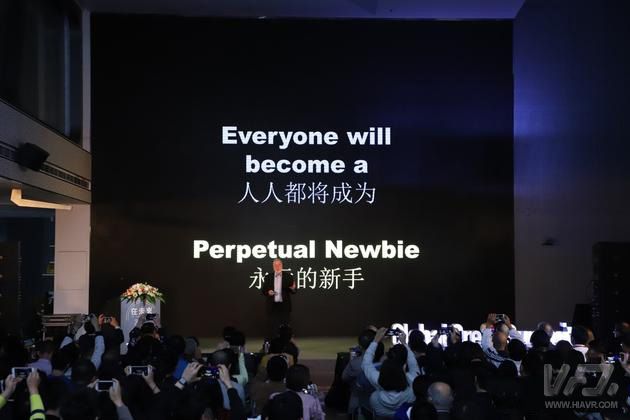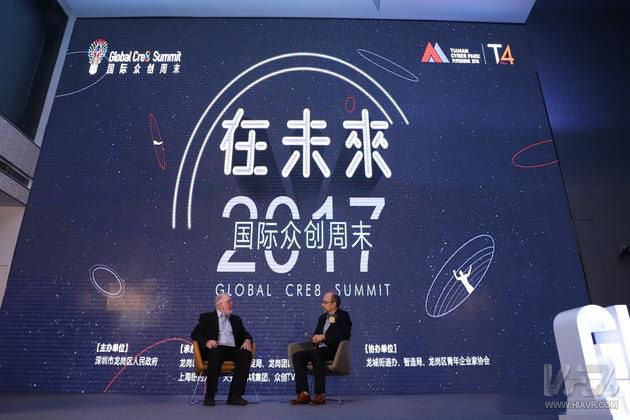VR Network learned that Kevin Kelly, the founding editor of Wired magazine and "Out of Control", recently attended the 2017 International Weekend held in Longgang Tianan Cyber ​​City, Shenzhen, and explained his dedication to technology. Ten trends of view, including data connectivity will lead to technology super body, the right to use will take precedence over ownership, virtual reality will become social media, and the screen will drive search tools from text based to images.
"I really believe that we are the best time in history and the best time for creating a customer." Kevin Kelly said that the next 25 most important products may not yet be discovered. "Now we have to do these things." It is not too late for great things."

"From tangible to intangible, from fixed to fluid, from noun to verb, and from product to service." Kevin Kelly points out that people are experiencing this process of change in any area . "Even if you are doing hardware, you may be able to turn from doing products to doing more hardware services. It may be that moving from fixed products to more is a flowing process."
He believes that the mobile format “makes us able to decentralize, allowing us to constantly upgrade, and to ensure that everything is fluid and volatile. This is the environment we are in and the most obvious feature.†At the same time, everyone All will become eternal newcomers and constantly need to learn new things.
The second major trend: data connectivity will lead to technology super body“What's the most mobile thing? It's data. No matter which industry you are in, or even real estate, agriculture, hotels, fashion, finance, or whatever industry you’re talking about, the importance of this data is The importance of your customers themselves is also included.†Kevin Kelly said.
He compared Ford and Tesla and produced 100 million Ford cars, but its market value was not as good as that of Tesla. "Why? That's the data. Ford had produced so many cars as a hundred-year-old company. In fact, he didn't have any data to understand how these owners drive cars. They couldn't directly contact these owners. But Tesla is such a new one. The company, he has accumulated 1.3 billion kilometers of data, so he is actually a data company, and the data is valuable."
How to make the data valuable? Kevin Kelly pointed out that "data and data are connected together, and the business will be valuable. So let this data can flow and can be connected together. This is our future trend. â€
He believes that data connectivity will lead to the birth of the technology super body. "We have so many transistors, connections, memory, etc. on Earth. We are creating these connections every day. We actually haven't realized it ourselves. After all the machines are connected together, they are actually a huge platform, so it will It will become the most important link in this society by becoming a technological super body. In the next 20 or 30 years, we will see the formation of this super body, which will become a super machine and the most reliable machine ever."
The third trend: use rights will take precedence over ownershipKevin Kelly thinks that the big trend now is to change from ownership to acquisition. He cited "Uber is the world's largest taxi company, but he does not have a car. Facebook is the world's largest social media, but he does not produce content himself. Alibaba is the world's largest retailer, but Alibaba itself is not in stock. Airbnb is the world's largest hotel group, but he does not own a hotel."
“Ownership and ownership are not as important as they used to be. Instant use, rapid delivery, direct production, dematerialization, and continuous upgrade are all changes that we can see in the physical world. So people no longer want to own What's going on, but economy on demand, is that 'Uber' will appear in all walks of life."
"Maybe in the future we don't even need to take a cell phone out. You can use a mobile phone when you need it, and this mobile phone is synchronized with your own mobile phone. When it's used up, it'll be back. Even the world is everywhere. On the screen, as long as you stand in front of it and it recognizes your identity, you don’t need to bring a mobile phone, so there will be more and more digital means to help you become such a digitized voyager. The right of access is better than owning."
"There are about 9,000 companies in Silicon Valley that are doing Uber-like on-demand services. Some of them are unsuccessful, but some are able to stand out." Kevin Kelly explained the use of shared bicycles in China as an example. "Well, sharing bikes is a good idea, but you don't need 100 companies that share bikes to do this, right. So the idea is good, but the outcome is still good."

Kevin Kelly said, “Now many companies are trying to protect their own intellectual property, not to be easily copied, but this is difficult to achieve, because the nature of the Internet economy is that anything that can be copied will be copied. The logic is that anything that can be tracked can certainly be traced."
Taking the intelligent positioning system and health data tracking as an example, he pointed out that all-round monitoring and tracking will collect massive amounts of data and quantify and measure many ideas at the same time.
Kevin Kelly points out that the result of this can allow individuals to get highly customized solutions. “If you hide something and you want to ensure privacy, then you cannot have such a personalized solution. Personalization means we need to be more transparent.â€
Fifth Trend: Artificial Intelligence Embeds in All CommoditiesKevin Kelly affirmed the prospect of artificial intelligence. He believes that artificial intelligence will be embedded in all commodities in the future, helping humans to achieve breakthroughs in thinking and guiding society to continue the second industrial revolution.
"Like electricity, artificial intelligence will be delivered to electricity through cloud services. It will become a service, become a commodity, and everyone can buy it. You don't need to produce it by yourself. You can buy it. Just like Use the power to use these intelligences to do something new. In the future there will be tens of thousands of startups in the business of applying artificial intelligence to a certain area, just as we used to automate traditional processes."
On the issue of employment, he believes that the future of human and artificial intelligence is not a confrontational relationship. “The robot will create new jobs for us, and the efficiency problem will be left to the robots. What kind of work do humans do? They are those who do not pay attention to efficiency. Work, such as science, innovation, and art that do not pay attention to efficiency."
The sixth big trend: virtual reality will become social mediaKevin Kelly pointed out that as the cost of goods becomes lower and lower, experiences, especially social experiences, will become more and more important to humans. Take mixed reality technology as an example, virtual reality technology will make interaction more and more powerful and make the experience very persuasive.
“The most important experience is still the experience of a social society. It can exist there and be able to participate in it. Even the interaction with cartoon characters is a very interesting experience that many people want. I think the future of virtual reality will be the most Social social media may also be the next most popular platform for smart phones, he said.
The seventh trend: sharing, collaboration“We are all under the influence of the sharing economy,†Kevin Kelly emphasized. “The extension of sharing is more about cooperation. Now all the good products and very new products we produce are born from human collaboration, but they were born Deeper collaboration. There are now 2 billion Facebook users worldwide, they form such a large network, and gradually can produce some valuable products and services, such as Wikipedia, it is built by people in collaboration. â€
"What's the problem? What about how to find a mechanism for collaboration, how to reward those who contribute, how to get them together, how to get everyone to play their respective strengths. So we mentioned here a new technology called Blockchain and blockchain can track the traces of interaction on all networks, so there are a variety of technologies that allow us to collaborate and cooperate with each other,†he said.

Kevin Kelly pointed out that the screen will become a kind of two-way communication. “When it looks at you, even some software can know whether your emotions were happy or depressed and can even track your attention. You can What places are you looking at? For instance, if you think this place is in doubt, they will know that you may not be able to understand them and they will find that you can track your emotions and know what you want to express."
He believes that with the advent of adaptive screens, search tools will shift from text based images. "Everything is now on the screen, and the screen means that they are all mobile, all imagery, 75% of the web content is actually images, not text. Now we also have new search tools. Can we help us to search for these hyperlinks, images, etc. In the past, many of our tools were based on text and text, but now that this change has taken place, we have entered an era of imaging, and we also need more new tools."
The ninth trend: questions are more valuable than answers"What's valuable now? It's not the answer. It's the problem," said Kevin Kelly. "Now, there are 1 billion answers on the Internet every day. But some decades ago, it was possible that no one raised these questions at all. Because no one gave you the answer, so this is a new requirement that we had never imagined before. The answer to these questions is free of charge and was previously charged."
He thinks that questioning is one of the sources of innovation. “A good question is that we don’t get answers but two new questions. In the future, I believe that our education will also develop in this direction. We ask people to raise questions. Questioning ability. Questioning is a source of our innovation. If we want a good answer, we can ask the machine. But if we want a good question, we must find someone to ask this question."
Tenth Trend: It's Not Late to Do Great ThingsFinally, Kevin Kelly inspires people to innovate. “We are only at the beginning of the beginning. We are on the first day of all things. Looking back at the past 25 years, we have found that we have the best tools and we now have the largest market. Our cost is now the lowest and the threshold is the lowest. Compared with the past, it is now the best time."
“We have to believe in things that cannot happen. If I say this speech 25 years ago, I would not mention any Internet problems because the Internet has not yet been produced. So the greatest product in the next 25 years must be me today. Products not yet involved."
He said, "In these new areas, we do not have experts. This is also the most exciting thing for the next 25 years. It means that it is not too late for us to do these great things now."
Laptops,windows Laptops,win11 Laptops,win10 Laptops
Jingjiang Gisen Technology Co.,Ltd , https://www.jsgisentec.com